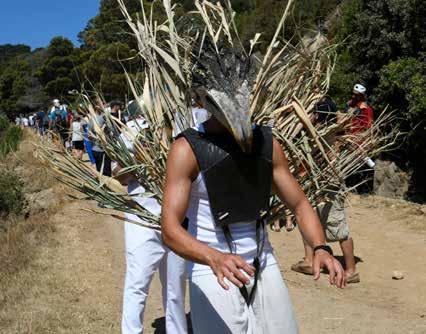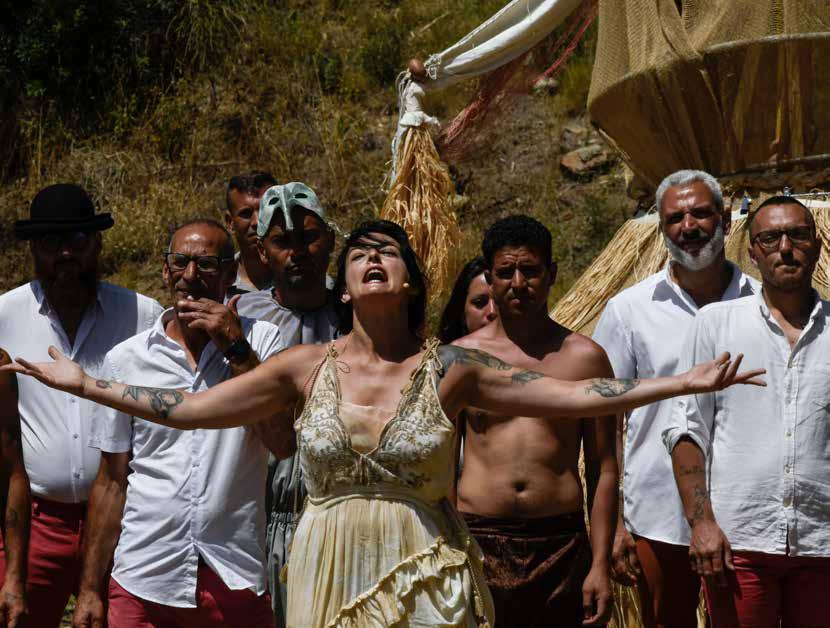
6 minute read
Le Metamorfosi rivivono alla Gorgona Metamorphoses on Gorgona
Il testo di Ovidio va in scena nell’ultima isola carceraria d’Italia. Ad interpretarlo gli stessi detenuti-attori-musicisti Metamorphoses on Gorgona Ovid’s masterpiece is staged on Italy’s last island penal colony, interpreted by prisoners-actors-musicians
Lo spettacolo nasce nell’ambito del progetto “Teatro in Carcere” reso possibile da un accordo fra la Regione Toscana e la casa di reclusione The performance was realised under the ‘Theatre in Prison’ project, an agreement between the Region of Tuscany and the prison
Advertisement
Le Metamorfosi rivivono alla Gorgona
C’è sempre un andare e tornare, nelle nostre vi-
te. Bello, sofferto e forse di nuovo bello. Basta vederlo, questo movimento, ma soprattutto viverlo e sentirlo, come nelle Metamorfosi che Ovidio rese in poesia oltre duemila anni fa. Perché nella nostra vita, quella terrena, c’è sempre la possibilità di ritrovare un altro corpo: l’ordine dopo il caos, la redenzione dopo l’errore e il peccato. Corpi che mutano in persone nuove come nell’opera del cantore latino e che un giorno, nei 2,2 chilometri quadrati dell’Isola di Gorgona, tuttora utilizzata come casa di reclusione, ci invitano per assistere a uno spettacolo teatrale. “Le Metamorfosi”, appunto, che anche oggi consentono di ripercorrere in modo poetico, ma con ironia, i grandi miti di fondazione della nostra civiltà: dall’Età dell’Oro a quella del Ferro; dal Minotauro a Diogene che cerca l’uomo, dall’Araba Fenice ad Apollo e Dafne. E ancora Teseo, Arianna, per rivedere le Grandi costellazioni del cielo. Fino a quando l’apparizione di un Cavallo marino non ci riporterà nel grembo della Grande Madre Terra. “Metamorfosi è uno spettacolo itinerante, un percorso in alcuni luoghi suggestivi di Gorgona carichi di uno straordinario potere evocativo”, spiega Gianfranco Pedullà, direttore del Teatro Popolare d’Arte di Lastra a Signa (Firenze), che ha messo in scena l’idea nel quadro del progetto “Il teatro del mare”, in collaborazione con Francesco Giorgi e Chiara Migliorini. Uno spettacolo nato ancor prima nell’ambito del progetto “Teatro in Carcere” (frutto di un’intesa tra la Regione Toscana e la casa di reclusione, già diretta da Carlo Alberto Mazzerbo), che vede la partecipazione diretta di detenuti-attori-musicisti.
Gianfranco Pedullà, direttore del Teatro Popolare d’Arte di Lastra a Signa (Fi) Gianfranco Pedullà, director of the Teatro Popolare d’Arte in Lastra a Signa (FI)
Life is in constant flux: now a delight, then a burden, then veering
back to delight. A state of flux we all perceive, but can still live and feel in Ovid’s epic poem Metamorphoses penned over two thousand years ago. Because in our earthly lives we too may transform ourselves, bringing order after chaos, redemption after error and sin. Bodies that mutate into a new incarnation as in Ovid’s great work and that one day invite us to attend a theatrical performance, in the unusual setting of the 2.2 square kilometres of the island of Gorgona, Italy’s last island prison. “The Metamorphoses” still acts as a poetic yet ironic guide to the great foundation myths of our civilisation: from the Golden Age to the Iron Age; from the Minotaur to Diogenes searching for man, from the Arabian Phoenix to Apollo and Daphne. And then Theseus and Ariadne illuminating
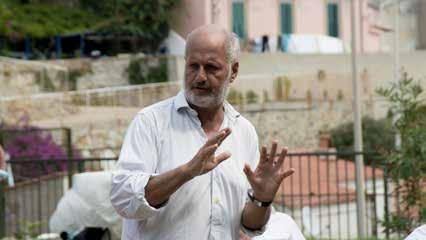
Metamorfosi è un invito a uscire dalle piccole prigioni del nostro quotidiano Metamorphosis is an invitation to break free from the little prisons of our daily lives
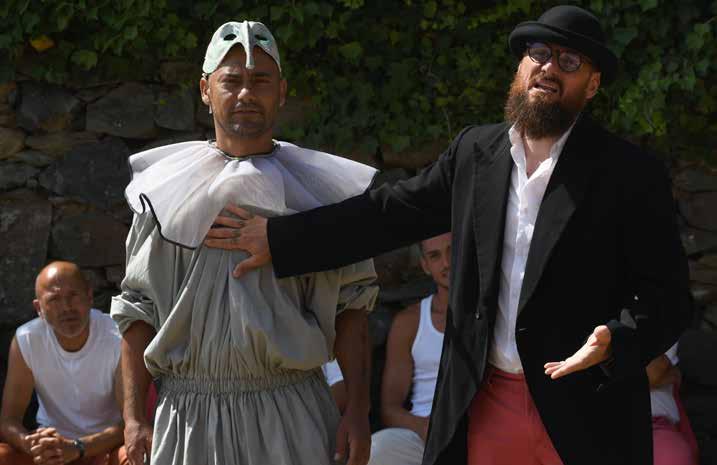
Il testo di Ovidio, nonostante i suoi duemila anni, conserva sempre aspetti simbolici di grande modernità Ovid’s two-thousandyear-old text still retains symbolic aspects of startling modernity
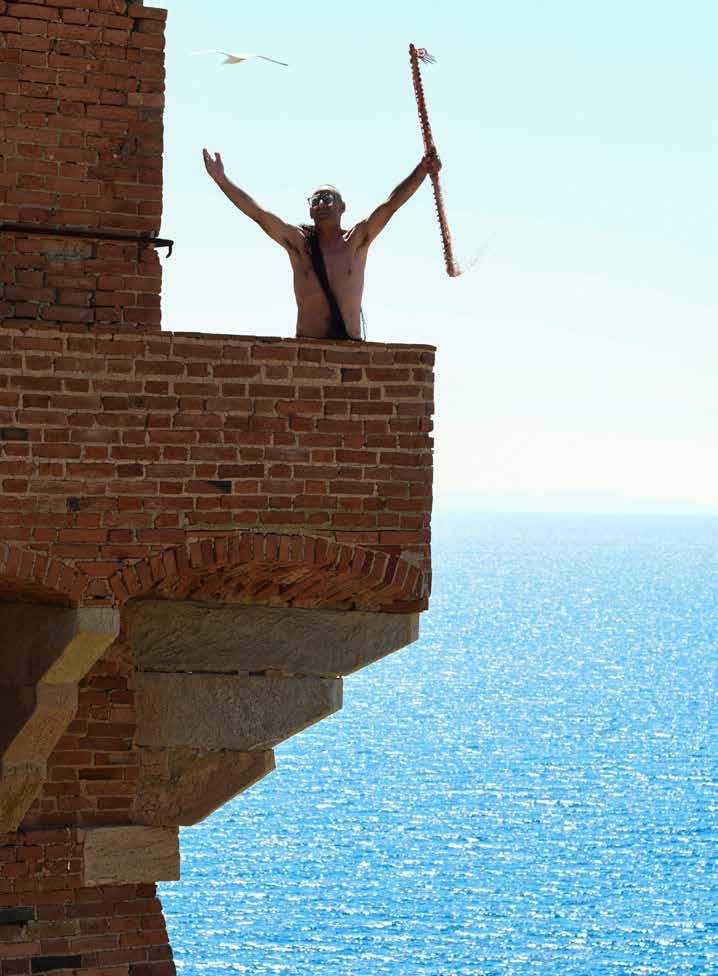
Il Minotauro baciato dal sole del Mar Ligure The Minotaur bathed in the sun of the Ligurian Sea

“Benvenuti nell’Isola della Meraviglia”, annuncia uno di loro agli spettatori arrivati via nave da Livorno, 36 chilometri a Nord-Est, in una mattina di sole che illumina terrazzamenti a fichi e ulivi, vigne e pini d’Aleppo. “La libertà è importante, ma la dignità è anche più importante”, gli fa eco un altro a seguire. Anche perché “le pene – come recita l’articolo 27 della nostra Costituzione – non possono consistere in trattamenti contrari al senso di umanità e devono tendere alla rieducazione del condannato”. “Anche Metamorfosi - osserva Pedullà - dopo il primo episodio “Ulisse o colori della mente”, è un invito a riappropriarsi della dimensione simbolica della vita, a uscire dalle piccole prigioni del nostro quotidiano. Una proposta di cambiamento per tuffarci nel mito del Mediterraneo e ripensare al nostro presente, immaginando un avvenire migliore”. “Con Ulisse mi sono sentito fuori luogo e a un certo punto ho rinunciato - dirà Luca (lo chiameremo così, ndr) dopo quasi due ore di spettacolo – ma adesso non mi giudico più: ora sto meglio, ho vinto la timidezza”. Voci della verità come quella di Paolo, che in scena sembrava un attore nato: “No, non ho mai fatto teatro prima di arrivare qui. Quando le mie figlie erano piccole, raccontavo però loro storie per farle addormentare”. Voci di uomini nuovi che un giorno lasceranno Gorgona. morning that illuminates the terraces of fig and olive trees, the vineyards and the Aleppo pines. ‘Freedom is important, but dignity is even more important,’ echoes another. ‘Punishments - as Article 27 of our Constitution states - cannot consist of treatment contrary to the sense of humanity and must aim to re-educate convicts’. “Metamorphosis,” Pedullà observes, after the first episode, ‘Ulysses or Colours of the Mind’, “is also an invitation to take repossession of the symbolic dimension of life, to emerge from the small prisons of our everyday lives. A proposal to change, to dive into the myth of the Mediterranean and rethink our present, imagining a better future’. “With Ulysses I felt out of place and at a certain point I gave up,’ says Luca (not his real name) after almost two hours of the show, ‘but now I no longer judge myself: now I feel better, I have overcome my shyness. Genuine voices like that of Paolo, who moved like a born actor on stage: ‘No, I’d never done any acting before coming here. But when my daughters were small I used to tell them stories to put them to sleep’. Voices of new men who will one day leave Gorgona.
Nessuno degli attori-detenuti aveva avuto esperienze teatrali prima dello spettacolo None of the actor-prisoners had any theatrical experience before the performance the great constellations of the sky. Until a Sea Horse appears to take us back to the womb of the Great Mother Earth. “Metamorphosis is an itinerant performance piece, a journey through some of Gorgona’s most evocative settings charged with an extraordinary emotional power,” explains Gianfranco Pedullà, director of the Teatro Popolare d’Arte in Lastra a Signa (Florence), who staged the idea as part of the ‘Theatre of the Sea’ project, in collaboration with Francesco Giorgi and Chiara Migliorini. Originally conceived in the context of the earlier ‘Theatre in Prison’ project, under an agreement between the Region of Tuscany and the prison, formerly directed by Carlo Alberto Mazzerbo, it sees the direct participation of prisonersactors-musicians. ‘Welcome to the Isle of Wonder,’ one of them announces to the spectators who arrive by boat from Livorno, 36 kilometres to the north-east, on a sunny
